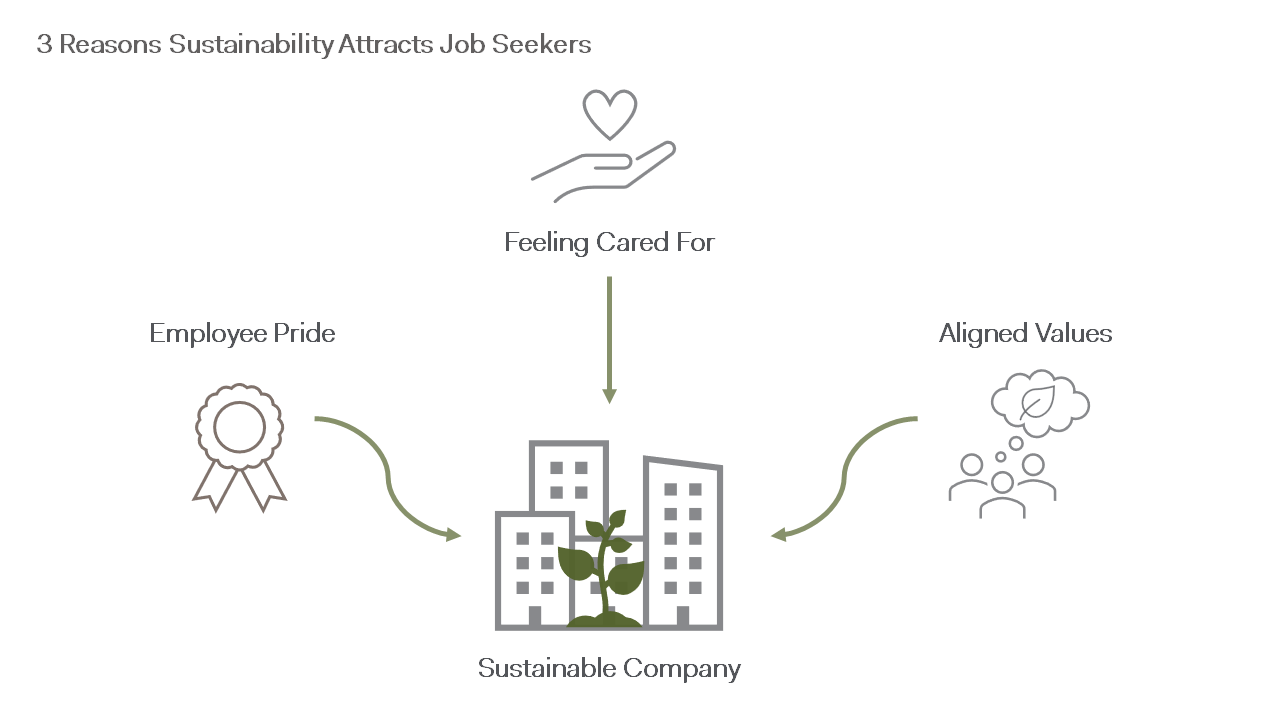How good corporate citizenship and sustainable business practices attract and help retain top-notch talent for your firm.
Researchers David Jones (University of Vermont) and Chelsea Willness (University of Saskatchewan) identify three ways that companies can use sustainability initiatives to draw the best talent.
Surveys consistently show that many people claim they want to work for a sustainable company. But talk is cheap — it’s easy to endorse such a noble desire on an anonymous survey. Is it actually true?
Employees Want to Work for Sustainable Companies
A growing body of evidence suggests that it is true. At least 12 peer-reviewed studies show that many job seekers are attracted to organizations with sustainable practices. Other studies show the same in relation to social practices more generally, like community involvement and ethical governance.
Most of this evidence comes from experimental studies conducted among university students. But students become graduates who look for jobs like anyone else; we’ve uncovered the same pattern of findings in two field studies conducted among active jobs seekers.
In our most recently published study, we asked career fair attendees to identify an organization that was among their most attractive employment options. These job seekers reported greater attraction when they believed the organization was more environmentally friendly. It seems that sustainable practices helped make organizations especially attractive options even when up against the most desirable employers at the career fair.
This attraction is a source of competitive advantage. Studies show that by drawing more applicants, organizations dramatically increase their chances of hiring a top performer.
3 Reasons Sustainability Attracts Job Seekers
What explains this appeal? And how can managers maximize it? Our research and other recent studies point to three mechanisms that explain why job seekers are attracted by sustainability. We’ll show you how to leverage each mechanism to attract and hire talented and committed employees through your sustainability initiatives.

Sustainability draws job seekers because it’s a source of employee pride
Sustainability actions often lift a company’s reputation and status, leading many job seekers to believe they’d feel proud to work for a prestigious organization admired for its sustainability.
Reinforce that anticipated sense of pride by creating and celebrating a distinctive reputation for sustainability. What you can do:
Adopt sustainability practices that exceed industry norms and distinguish your organization from other employers, such as by integrating sustainability with your brand, products, and services.
Link sustainability to the organization’s prestige by seeking recognition and awards from reputable third-party organizations.
Demonstrate employee pride through testimonials and by showing how you celebrate sustainability achievements.
Sustainability draws job seekers because it implies the company cares about its employees.
To some job seekers, sustainability initiatives suggest that if a company genuinely cares about the well being of the greater society, it would therefore stand to reason that it likely treats its employees well.
Reinforce the belief that the company cares about society and the planet more generally, and link this to your people practices. What you can do:
Showcase employee-driven sustainability initiatives to illustrate how your concern for sustainability is tied to efforts to create meaningful and rewarding experiences for your employees.
Communicate to job seekers how your sustainability practices are connected to your people practices through messages like, “We strive to reduce our environmental impact because we care about how we treat the planet, just like we care about how we treat our people.”
Some may be skeptical of this kind of value-laden message, even viewing it as a self-serving marketing ploy. Job seekers know that the primary purpose of most for-profit organizations is to make money. So be transparent about viewing sustainability as a source of competitive advantage through reduced energy costs, employee retention, brand management, and so on. But people tend to react negatively unless they see motives beyond profit-seeking, so be sure to link your sustainable practices to social and environmental values as well
Sustainability connects organizational values to job seekers’ personal values.
Job seekers want an employer whose values are a good fit with their own. More than three decades of research shows that the match a person feels with an organization is a major driver of job choice decisions.
Clearly link your sustainability initiatives to specific organizational values and demonstrate their authenticity. What you can do:
Explicitly describe company values that drive specific sustainability actions, such as values about protecting the natural environment, managing relationships with external stakeholders, addressing employee concerns, and being a responsible corporate citizen.
Highlight management’s commitment to sustainability—from the C-suite through to the front lines. Managers set the tone on values and organizational culture, so use managers as role models. Show job seekers how sustainability is infused in daily work activities, training programs, reward systems, and operational practices and objectives. Your hiring practices are a great place to start.
Communicating Sustainability to Job Seekers
If you want to successfully leverage sustainability initiatives during recruitment, remember:
Sustainability messages can only add value if they reach job seekers. Use multiple channels to inform job seekers about your sustainability, such as company websites, careers pages, employee testimonials, recruitment handouts, conversations with recruiters, and position announcements.
Avoid greenwashing. If new employees find that the messages about sustainable practices that initially attracted them are really just a green veneer, many will become resentful and some will leave. Messages about sustainability need to match the reality that new hires will experience.
We hope these strategies help you transform your sustainability initiatives into a reputational asset that attracts high-performing employees. As researchers, we seek to partner with sustainable organizations to conduct more field studies in job search contexts. So stay tuned for more evidence-based advice about using effective and honest communication to position your organization as a green employer of choice.
About the Authors
David A. Jones is an Associate Professor of Management in the University of Vermont’s Grossman School of Business. David is a passionate and prolific scholar, publishing his work in top journals. His research interests include workplace fairness and revenge, but in recent years he has focused on studying how job seekers and employees respond to a company’s community involvement and sustainable practices. His work in this area, much of it with Dr. Willness, has received scholarly recognition and awards, and has been published in peer-reviewed journals and scholarly books.
Chelsea R. Willness is an Assistant Professor of Human Resources and Organizational Behaviour at the Edwards School of Business, University of Saskatchewan. Her research focuses on how organizations’ environmental practices and community involvement (e.g., CSR) impact reputation, which in turn affects talent attraction and retention, employee engagement, and consumer behaviour. She also examines the ‘dark side’ of CSR, studying when and why people become sceptical or cynical. Chelsea conducts research on strategic human resource management and community engagement partnerships. She frequently presents her research for academic, business, and industry audiences, and has published her work in top journals.
Additional Resources
Jones, D. A., & Willness, C. R. 2013, forthcoming.Corporate Social Performance, Organizational Reputation, and Recruitment. In K. Y. T. Yu & D. Cable (Eds.), The Oxford Handbook of Recruitment. Oxford University Press.
Willness, C. R., & Jones, D. A. 2013.Corporate Environmental Sustainability and Employee Recruitment: Leveraging “Green” Business Practices to Attract Talent. In A. H. Huffman & S. R. Klein (Eds.), Green Organizations: Driving Change with I-O Psychology (pp. 231-250). Routledge Academic.


Add a Comment
This site uses User Verification plugin to reduce spam. See how your comment data is processed.This site uses User Verification plugin to reduce spam. See how your comment data is processed.